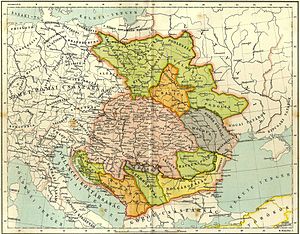- Decree of Turda
-
The Decree of Turda was a decree by Louis I Anjou of Hungary. It had longstanding consequences for the constitutional order and social structure of Transylvania.
On 28 June 1366, while residing in the Transylvanian town of Turda/Torda, Louis enacted a decree to reinforce law and order, regulating some areas of social and public life, administration, criminal law and judicial practice.
The conditions imposed by the decree for maintaining or acceding nobility (in particular, affiliation to the Roman Catholic Church and possession of a royal certificate of donation for the owned land) were to select and limit the noble class over a period of centuries, which in turn accelerated the decline of the Estate of Romanians (Universitas Valachorum). [1]
The decree takes an explicitly negative view of Romanians: propter presumptuosam astuciam diversorum malefactorum, specialiter Olachorum[1] in ipsa terra nostra existencium (…) ad exterminandum seu delendum in ipsa terra malefactores quarumlibet nacionum, signanter Olachorum [2] - because of the evil arts of many malefactors, especially Romanians, who live in that our country (…) to expel or to exterminate in this country malefactors belonging to any nation, especially Romanians.
This was the first time in Transylvania that discriminatory law enforcement along ethnic lines was legally codified. [1]
There were both political and religious reasons for this. Being a native of the Italian branch of the illustrious French family of Anjou, Louis, who reigned between 1342 and 1382, personified the magnificent medieval monarch, eminent son of and fighter for the Roman Catholic Church, protector of the Arts and knight of long-ranged imperial ideals. Under his reign, Hungary became a great European power, connected to the ideals and work of the Catholic Church and the Imperial mission.
Louis I's systematic Catholic proselytising campaigns encountered a determined resistance among Romanians, who were Eastern Orthodox. [1]
In addition to this religious defiance, the emerging Romanian feudal states southward and eastward of Transylvania, which continued to be considered by the Hungarian Crown as its own borderlands, became independent (1330 - Walachia/Ţara Româneasca, "Romanian Land"; 1359 – Moldova), in spite of military campaigns (1330 and 1358–1365) to restore Hungarian sovereignty.
Confronted with a demographically very significant Eastern Orthodox Romanian population in Transylvania which was reluctant to convert to Roman Catholicism, the Hungarian Crown was inevitably worried by the recent rise of two consolidated Orthodox states on Transylvania's southern and eastern borders[citation needed].
After the proclamation of the first Orthodox Romanian Metropolitan Church (1359) and an unsuccessful campaign against Walachia in the same year, and after military expeditions into Moldova had been abandoned (1365), the decree of Turda took legal measures in order to contain a perceived danger of growing influence of Eastern Orthodoxy in the Catholic and apostolic Kingdom of Hungary.
Notes
References
- ^ a b c Pop I.-A., Nations and Denominations in Transylvania (13th - 16th Century) In Tolerance and Intolerance in Historical Perspective, edited by Csaba Lévai et al., Edizioni PLUS, Università di Pisa, 2003, p. 111 – 125
- ^ I. Dani, K. Gündish et al. (eds.) Documenta Romaniae Historica, vol. XIII, Transilvania (1366-1370), Editura Academiei Române, Bucharest 1994, p. 161-162
Wikimedia Foundation. 2010.

